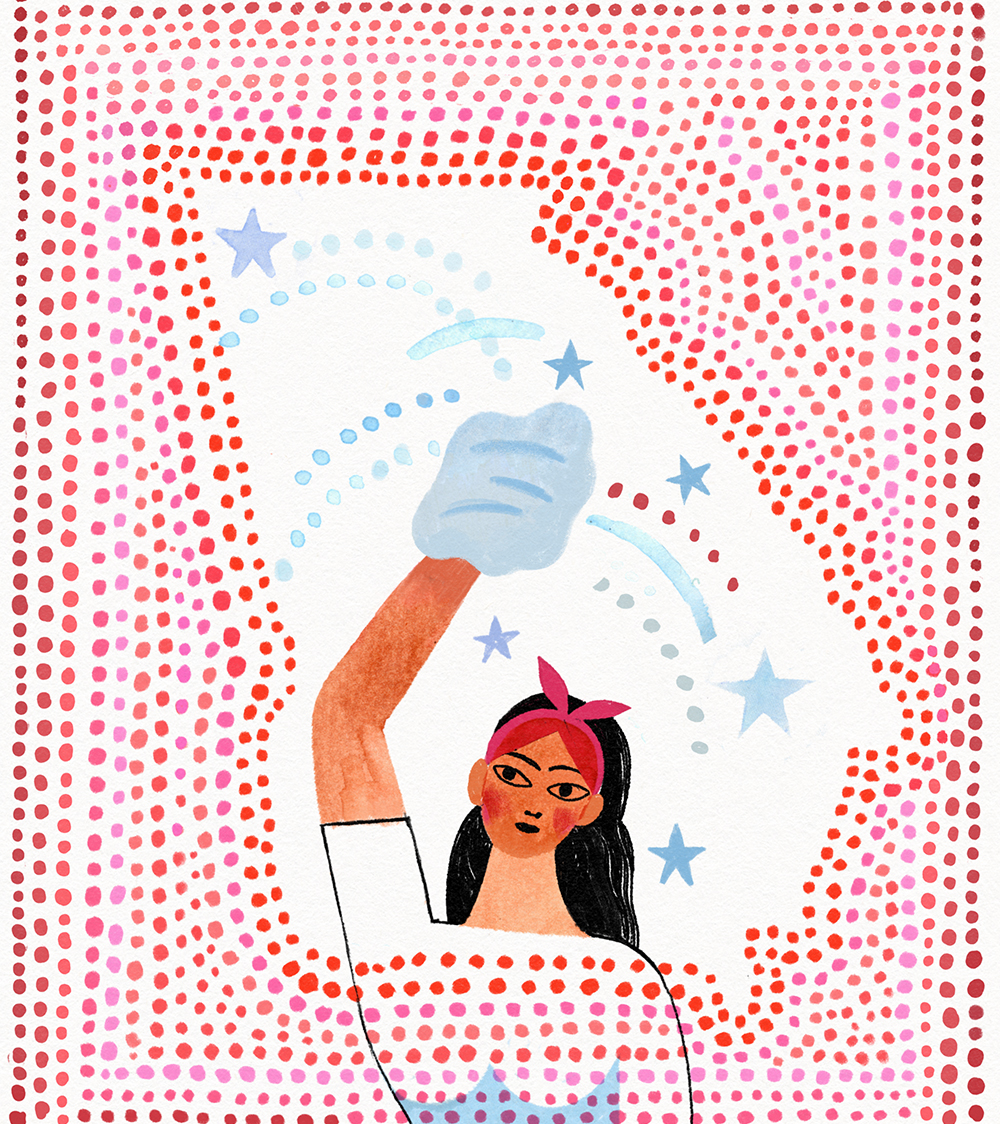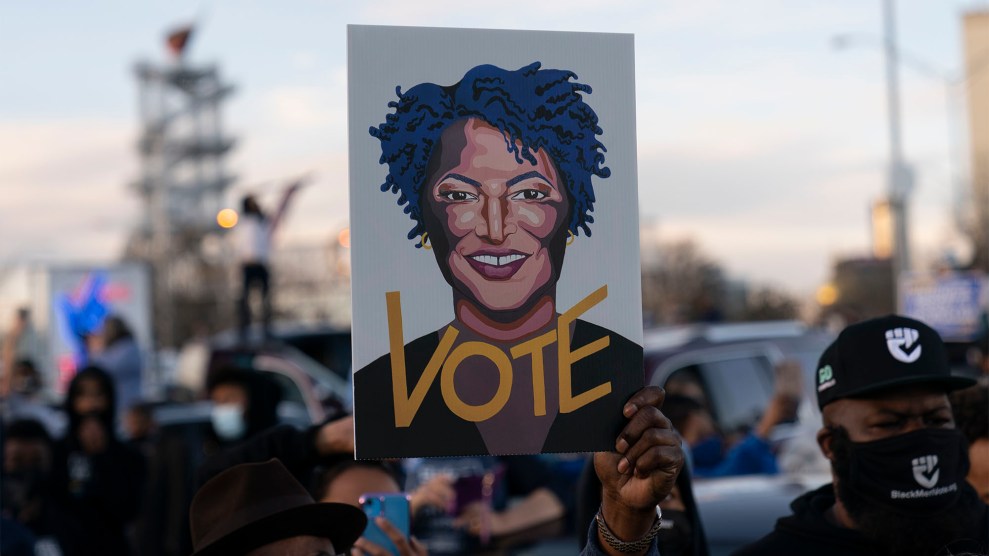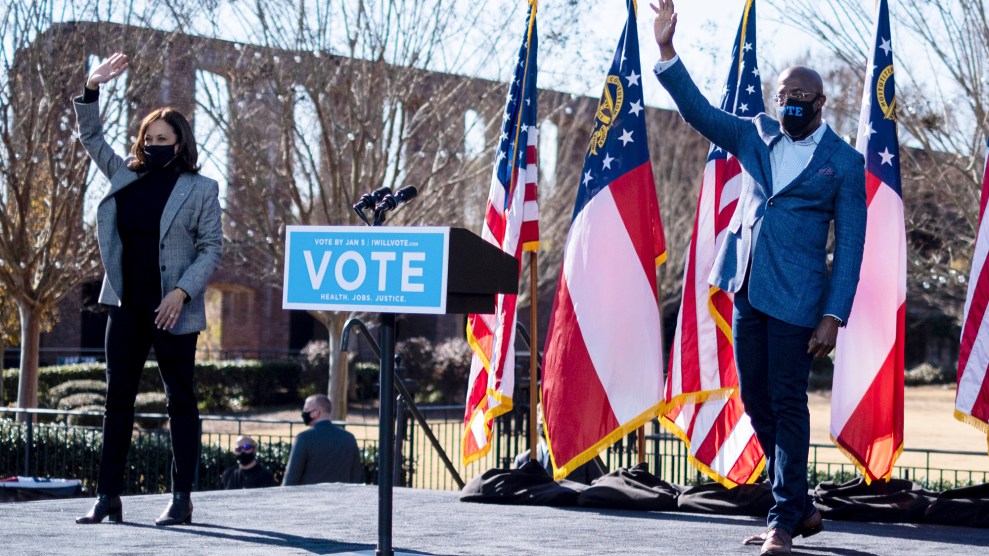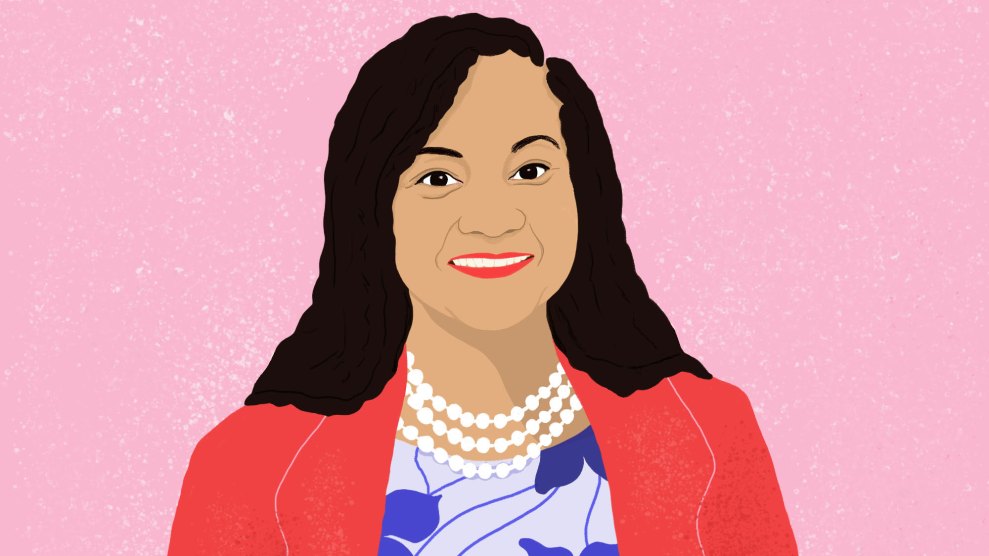“You ever been here?” Yterenickia Bell asks me as we wait for the door to the Cascade Skating Rink to be unlocked. “It’s historic,” she says, ushering me out of the December rain and into the fluorescent-lit roller-skating spot in west Atlanta’s Adamsville neighborhood. “People have been gathering here for years.”
The rink is awaiting the night crowd. Video games sit silent in a corner. The snack bar is dark except for a flashing neon sign. But it’s not empty: a handful of people in orange shirts and masks are chatting at the other end of the rink before braving the rain to get out the vote for Senate candidate Raphael Warnock. Bell is the GOTV director for Care in Action, an advocacy group whose members are mostly nannies, housecleaners, and home health workers. “We operate out of here because we have everyday folks that are workers that may have lost their jobs due to COVID, and a saturation of them live in this area,” she says. “It’s the community helping the community.”
I’d come to Georgia to see Democrats’ ground game ahead of the Senate runoff, and in particular, to understand the role that this group of domestic workers, most of whom are women of color, has had in turning the state purple. Right now the rink is the center of the action. From here, Bell has been organizing 250 door-knockers a day to get the word out about the race and voting logistics. “It takes people who are committed to this work, who know what’s at stake,” she says. “They have to get up every morning at eight o’clock to be here by nine for training and then go out to their specific turf and knock on people’s doors.” In the two months leading up to the runoff, Care in Action reached out to 5.85 million voters, either by phone, by mail, or in person, including more than 1 million door knocks. “Georgia is about to save our whole democracy, so we’re all in,” Bell says.
Those efforts paid off. Just after Georgians elected a Democrat for president for the first time in 30 years, they went on to pick Warnock, a Black preacher, and Jon Ossoff, a Jewish millennial, to represent them in the Senate, clinching Democrats’ narrow control of the chamber. In majority-Black precincts, early numbers indicated that the turnout in the January runoff would surpass that of November 2020 and reach a level not seen since Barack Obama’s 2012 reelection. Republican turnout was also strong, but not enough to turn back a second blue wave in so many months.
Though Care in Action is not affiliated with Stacey Abrams, who has been widely credited with turning Georgia blue, its work is a direct extension of Democrats’ decade-long effort to reshape the state by organizing voters of color. “What it takes to win in Georgia is a multiracial coalition,” says Rep. Nikema Williams, who served as Care in Action’s deputy director in 2018 and now holds the US House seat formerly held by Rep. John Lewis. And just as that coalition did not come together overnight, it also drew upon generations of organizing by Black domestic workers. “I do believe that investment in long-term, community-based organizing and power building does pay off,” says Ai-jen Poo, Care in Action’s senior adviser and the founder of the National Domestic Workers Alliance. “Throughout our history, Black domestic workers have organized and have really asserted their dignity through organizing.”
Atlanta is the birthplace of that movement. The first recorded domestic workers’ strike was in 1881, when Black women in Atlanta left their posts to demand better wages. Dorothy Lee Bolden helped create the National Domestic Workers Union of America (a precursor to NDWA) in the city in 1968. It was less a formal union than an education and advocacy effort, which Bolden led for nearly three decades. She built an infrastructure that took the union directly to the people it represented, using public buses to hold informal meetings and recruit domestic workers during their daily commute. There were two requirements to join the union: Members had to be domestic workers, and they had to vote.
Bolden started her career as a domestic worker when she was 9, washing diapers for the family who employed her mother as a housekeeper. As an adult, she cleaned houses and looked after children during the day, and spent her nights watching Dr. Martin Luther King’s speeches on television while she sewed for her daughters. She marched with King when he came to Atlanta and she organized a boycott of city schools in 1964 to protest disparities in education quality between Black and white children, and she applied the lessons from her activism to the NDWU. “A domestic worker is a counselor, a doctor, a nurse; she cares about the family she works for as she cares about her own,” she said in 1983. Even so, she noted, domestic workers “have never been recognized as part of the labor force.” She was determined to change that, and in doing so she built a lasting community among domestic workers where there once had been disempowered people working in isolation.
The NDWU eventually spread to 10 more states, won workers’ compensation and Social Security benefits, and helped raise the minimum wage in Atlanta by 33 percent. Bolden also had an influential voice that affected national policy; her expertise was sought by presidents Nixon, Ford, and Carter.
The movement fizzled a bit in the ’80s as union power declined but it was revived a decade ago when Poo began organizing home care workers to push for greater labor protections. After notching win after win, she realized that the women she’d helped bring together were an untapped voting bloc. In 2018, she launched Care in Action to get out the vote for women candidates who stand by policies that domestic workers could benefit from. That same year, Abrams ran for governor of Georgia while pushing an unabashedly progressive agenda that included expanding Medicaid, raising the minimum wage, and ensuring quality public education. Abrams received Care in Action’s first endorsement, and the group mobilized 300 domestic workers to canvass for her.
People who worked on that campaign recall there was a beautiful synergy in domestic workers rallying for the possibility of Abrams becoming Georgia’s first Black governor. “We were very intentional about running a program that reached out to people that have been overlooked in the political process for way too long,” Williams recalls. “Our unique skill set was having our membership actually do the canvassing. It really changed the game for us and the way we were able to expand the electorate.”
Though Abrams lost her bid, thanks in no small part to the voter suppression tactics of her opponent, then–Secretary of State Brian Kemp, Poo and others felt they had bottled lightning. Indeed, in terms of people pounding the pavement, Care in Action was the largest independently funded grassroots effort in Georgia during the 2018 election cycle. Since then, it has expanded into Virginia, North Carolina, South Carolina, Nevada, Arizona, and Michigan. It started small, focusing on a few state candidates and the presidential election, with an eye toward expanding its operations in Georgia.
Despite the challenges presented by a pandemic that forced a rethink of its campaign outreach and infrastructure, Care in Action was able to carry the energy from 2018 through two more hard-fought races in 2020. “I think that [Abrams’ loss] was the momentum that we needed, that propelled us to be ready and to be able to launch for the Senate runoff as well as engage in a general,” Bell says. “We were able to essentially flip our state blue.”
The stakes are clear to Melanie Jackson, a domestic worker in the Atlanta area who tells me that canvassing with Care in Action made her feel like she was making a difference in a state whose elections have deep repercussions for the rest of the country. She recalls a recent conversation she’d had with a Black man in his 30s who told her he wasn’t planning to vote—he just didn’t feel like there was any point. She says she stared at him, incredulous. “You’re gonna miss the first opportunity to send a Black man from Georgia to the United States Senate?” she asked him.
He responded, “Sister, just because you said that, I’m going to go vote for the guy.”
“We locked eyes,” she told me. “I know that he went and followed through on that, and he probably thought about me as he was pressing those buttons. No doubt in my mind.”
















